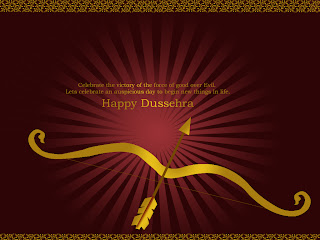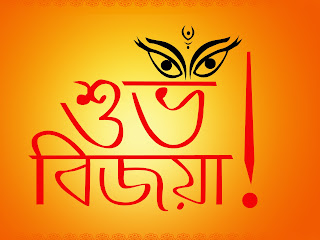Onam is the biggest festival in the
Indian state of Kerala. Onam Festival falls during the Malayali month of
Chingam (Aug - Sep) and marks the homecoming of legendary King Mahabali.
Carnival of Onam lasts for ten days and brings out the best of Kerala
culture and tradition. Intricately decorated Pookalam, ambrosial
Onasadya, breathtaking Snake Boat Race and exotic Kaikottikali dance are
some of the most remarkable features of Onam - the harvest festival in
Kerala.
Friday, January 20, 2012
Dussehr Wallpapers
In the months of Ashwin and kartik, Hindus observe a 10 day
ceremony of fast, rituals, celebrations, fiests to honor the mother Goddess and
triumph of Lord Rama over Demon Ravana. Dussehra also symbolizes the triumph of
warrior Goddess Durga over the buffalo
demon, Mahishasura. Thus, it is a celebration of victory of good over evil.
This celebration starts from Navratri and ends with the tenth day festival of “Dussehra”. Navratri and Dussehra is celebrated throughout the country at the same time, with varying rituals, but with great enthusiasm and energy as it marks the end of scorching summer and the start of winter season.
The tenth day after Navratri is called Dussehra, on which number of fairs are organized throughout the northern India, burning effigies of Ravana.It is also called “Vijayadashmi” as this day marks the victory of Lord Rama over Ravana. VijayaDashami is considered to be an auspicious day for the Indian householder, on which he worships, protects and preserves 'Shakti' (power). According to Scriptures, by worshipping the 'Shakti' on these nine-days the householders attain the threefold power i.e. physical, mental and spiritual, which helps him to progress in life without any difficulty.
The 'Ramlila' - an enactment of the life of Lord Rama, is held during the nine days preceding Dussehra. On the tenth day (Dussehra or Vijay Dasami), larger than life effigies of Ravana, his son and brother - Meghnadh and Kumbhakarna are set to fire.
The theatrical enactment of this dramatic encounter is held throughout the country in which every section of people participates enthusiastically.
In burning the effigies the people are asked to burn the evil within them, and thus follow the path of truth and goodness, bearing in mind the instance of Ravana, who despite all his might and majesty was destroyed for his evil ways.
This celebration starts from Navratri and ends with the tenth day festival of “Dussehra”. Navratri and Dussehra is celebrated throughout the country at the same time, with varying rituals, but with great enthusiasm and energy as it marks the end of scorching summer and the start of winter season.
The tenth day after Navratri is called Dussehra, on which number of fairs are organized throughout the northern India, burning effigies of Ravana.It is also called “Vijayadashmi” as this day marks the victory of Lord Rama over Ravana. VijayaDashami is considered to be an auspicious day for the Indian householder, on which he worships, protects and preserves 'Shakti' (power). According to Scriptures, by worshipping the 'Shakti' on these nine-days the householders attain the threefold power i.e. physical, mental and spiritual, which helps him to progress in life without any difficulty.
The 'Ramlila' - an enactment of the life of Lord Rama, is held during the nine days preceding Dussehra. On the tenth day (Dussehra or Vijay Dasami), larger than life effigies of Ravana, his son and brother - Meghnadh and Kumbhakarna are set to fire.
The theatrical enactment of this dramatic encounter is held throughout the country in which every section of people participates enthusiastically.
In burning the effigies the people are asked to burn the evil within them, and thus follow the path of truth and goodness, bearing in mind the instance of Ravana, who despite all his might and majesty was destroyed for his evil ways.
Thursday, January 19, 2012
Harvest Festivals Wallpapers
Makar Sankranti
Makar Sankranti is one of the most auspicious occasions for
the Hindus, and is celebrated in almost all parts of the country in myriad
cultural forms, with great devotion, fervour & gaiety. It is a harvest
festival. Makar Sankranti is perhaps the only Indian
festival whose date always falls on the same day every year i.e.
the 14th of January.
Makar Sankranti is the day when the glorious Sun-God begins its ascendancy and entry into the Northern Hemisphere and thus it signifies an event wherein the Sun-God seems to remind their children that 'Tamaso Ma Jyotir Gamaya', may you go higher & higher, to more & more Light and never to Darkness.
To Hindus, the Sun stands for knowledge, spiritual light and wisdom. Makar Sankranti signifies that we should turn away from the darkness of delusion in which we live, and begin to enjoy a new life with bright light within us to shine brighter and brighter. We should gradually begin to grow in purity, wisdom, and knowledge, even as the Sun does from the Day of Makar Sankranti.
Makar Sankranti is the day when the glorious Sun-God begins its ascendancy and entry into the Northern Hemisphere and thus it signifies an event wherein the Sun-God seems to remind their children that 'Tamaso Ma Jyotir Gamaya', may you go higher & higher, to more & more Light and never to Darkness.
To Hindus, the Sun stands for knowledge, spiritual light and wisdom. Makar Sankranti signifies that we should turn away from the darkness of delusion in which we live, and begin to enjoy a new life with bright light within us to shine brighter and brighter. We should gradually begin to grow in purity, wisdom, and knowledge, even as the Sun does from the Day of Makar Sankranti.

Pongal Festival
Pongal is a four-days-long harvest festival
celebrated in Tamil Nadu, a southern state of India. For as long as
people have been planting and gathering food, there has been some form
of harvest festival. Pongal, one of the most important popular Hindu
festivals of the year. This four-day festival of thanksgiving to nature
takes its name from the Tamil word meaning "to boil" and is
held in the month of Thai (January-February) during the season when rice
and other cereals, sugar-cane, and turmeric (an essential ingredient in
Tamil cooking) are harvested.
Mid-January is an important time in the Tamil calendar. The harvest festival, Pongal, falls typically on the 14th or the 15th of January and is the quintessential 'Tamil Festival'. Pongal is a harvest festival, a traditional occasion for giving thanks to nature, for celebrating the life cycles that give us grain. Tamilians say 'Thai pirandhaal vazhi pirakkum', and believe that knotty family problems will be solved with the advent of the Tamil month Thai that begins on Pongal day. This is traditionally the month of weddings. This is not a surprise in a largely agricultural community - the riches gained from a good harvest form the economic basis for expensive family occasions like weddings.
Mid-January is an important time in the Tamil calendar. The harvest festival, Pongal, falls typically on the 14th or the 15th of January and is the quintessential 'Tamil Festival'. Pongal is a harvest festival, a traditional occasion for giving thanks to nature, for celebrating the life cycles that give us grain. Tamilians say 'Thai pirandhaal vazhi pirakkum', and believe that knotty family problems will be solved with the advent of the Tamil month Thai that begins on Pongal day. This is traditionally the month of weddings. This is not a surprise in a largely agricultural community - the riches gained from a good harvest form the economic basis for expensive family occasions like weddings.
Subscribe to:
Comments (Atom)
-
Guru Nanak Gurpurab also known as Guru Nanak Dev Ji's Prakash Utsav , marks the birth anniversary of the first Sikh Guru , Guru Nan...



















































